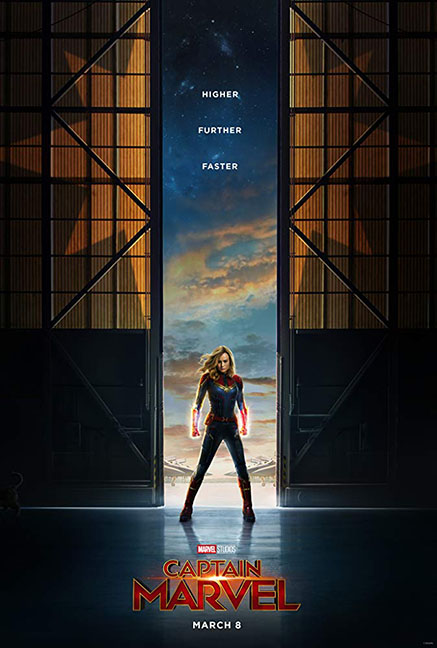The final battle in “Captain Marvel” is a one-on-one fight between our hero and the film’s primary villain. This is no spoiler. In fact, it has become a climactic necessity in our superhero expectations of the Marvel Cinematic Universe, whether the hero hails from Wakanda, Asgard, or Earth. This is the usual stuff. Except, this time it’s not quite the same. The hero this time is different. Although from Earth, our hero is a woman – Carol Danvers. The first female character to lead a film in the Marvel Cinematic Universe. At the height of the battle, goaded by the mocking words of her combatant, our hero interrupts the sequence of the fight to declare, “I don’t need to prove anything to you.” The line reverberates through the text of the film and cuts all the way into the film’s cultural value, backwards and forwards.
No one can accuse “Captain Marvel” of being unsubtle. And how could it? It’s a big-budget blockbuster in a film series that has redefined popular cinema. Cinemas across Guyana, and around the world, have overwhelmed their schedules with screenings of “Captain Marvel”, a regular occurrence whenever any film from the Marvel Cinematic Universe appears. With the weight of the series as context, the line makes sense. Marvel has nothing to prove as it continuously gets people into theatres multiple times a year looking forward to the next entry. And, yet, in another way the line is not true. For, “Captain Marvel” comes weighed down by the knowledge that it is the first film of the 21 Marvel has produced since 2008’s “Iron Man” that has featured a female protagonist. However, one cannot divorce the extra-textual noise surrounding the film, and preceding its production even, from the film. “Captain Marvel,” like the group of Avengers she precedes, is a single commodity in a larger group of commodities. Fans have a heightened sense of ownership for the Marvel films. So, lead actress Brie Larson’s push for a more diversified set of film critics beyond the usual white male reviewers has garnered criticisms from a small subset of male fans who feeling threatened by not being the centred. “Captain Marvel,” rather than existing on its own terms, arrives under an air of scrutiny. The film’s arrival cannot help but feel weighed down by all the discourse. Last April, at the end of “Avengers: Infinity War,” Carol’s presence was signalled and with its premiere preceding next month’s “Avengers: Endgame,” the existence of this film couldn’t feel more weighted. As if the existence of the series hangs on this thread. But all that weight dissipates in relation to Carol, who is on her own singular journey that, at the best of moments, feels critically removed from the noise around it.
“Captain Marvel” is an origin story. We first meet Danvers, here called Vers, as a Starforce member on the planet of Hala. She is a soldier in a battle we do not quite understand. Even she does not seem to quite understand it. And the first few sequences of the film are a dizzying riff on a retro Sci-Fi film until Vers crashes to Earth after a foiled battle where she must piece together the implications of a fight that extends across the universe. It is here that she will meet a youthful Nick Fury in the mid-nineties and piece together her identity and the beginnings of The Avengers initiative. If this sounds weighted with foreshadowing and like a film that benefits only from the knowledge of the future, “Captain Marvel” is a quiet surprise for the way it textually refutes any overemphatic dependence on context, legacy or history.
I admit to my occasional ambivalence towards the Marvel Empire, mired as it is with films that exist more as propellers for future entries than films with their own identities. Identity is what is at stake in this film. Carol is confused by memories of her past uncertain as to who she was before she appeared on Hala half a decade ago. She must navigate her life as a soldier on the planet and the most significant issue here is the way the film is not completely able to establish just what her motivation for being a soldier is. She is conspicuously opaque as a character, as if nothing really bothers her. It’s a reserve of calm that at first seems odd, but as the film develops, her steely mood becomes an essential part of its easy warmth. It’s that easy warmth that defines much of the middle sequence, where instead of a propulsive movement towards a great climax, the film feels discursive and ambling but in a way that’s warm and thoughtful and undeniably pleasant. When the requisite twists come, it’s significant the way the way the film takes current cultural issues, like the refugee and migrant crises, and contextualises them for its own purpose.
But “Captain Marvel” is not just Captain Marvel; the point is in its name and so the film must end with the note that “Captain Marvel will return in Avengers: Endgame.” The mid-credits and end-credits scene build up Carol’s relationship to the film’s lore, preparing us for the future. But, “Captain Marvel” is at its best when it self-reflexively goes small and ignores the context. The name feels like a misnomer (although the revelation of the name Marvel is a nice sequence). The film does not provide fireworks of marvellous antics in our anticipation of what it is to be a superhero. Instead, it gently reconfigures our focus to slight and tiny things, an awareness of things beyond the usual focus. The key heroic moment is not of our hero achieving success but a well-made montage of her getting-up after a fall over a series of years. The film that surrounds her is a weird ambling journey of a woman trying to reclaim herself. And, it’s a pleasant ride.
“Captain Marvel” is now playing at Princess Movie Theaters and Caribbean Cinemas Guyana.






